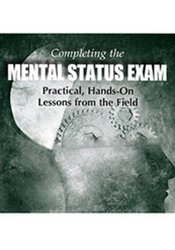

Perform and Document the MSE Correctly to Improve Treatment and Liability Protection
Completing the mental status exam is the most important task assumed by any behavioral health clinician. Accurate evaluation can be difficult because psychiatric symptoms often mask life-threatening substance withdrawal and/or serious medical conditions including brain tumors, delirium, head injury, diabetes, thyroid disease, etc. However, many graduate programs do not teach clinicians enough about recognizing and differentiating such symptoms. An accurate and efficient MSE is essential to discerning the patient's true condition, developing an effective treatment plan, and, in extreme cases, saving his or her life.
This practical recording will help you improve your ability to perform the MSE by teaching you critical information generally not covered in graduate school as well as the American Psychiatric Association (APA) guidelines on the necessary elements for a full examination. Instruction on proper evaluation and keys to differential diagnosis will be a central theme of the recording. Included will be information on the assessment of various psychotic symptoms and how to understand their etiology, the use of drug and alcohol screens, clients' medication lists, and more.
You'll discover ways of quickly assessing clients at risk for suicide, homicide, and medical compromise. Additional discussion will focus on the role of various information sources for accurate assessment of patients in each age group, including lab values, family members, and medical records. Ultimately, this essential recording will teach you to perform and document the MSE correctly and efficiently to improve both clinical care and liability protection.
| File type | File name | Number of pages | |
|---|---|---|---|
| Manual - Completing the Mental Status Exam (2.18 MB) | 106 Pages | Available after Purchase |
Tim Webb, M.A. Ed., LPC, is the founder and CEO of The FOCUS Group, PLLC, a Clemmons, North Carolina based clinical training and consultation agency specializing in developing comprehensive programs for mental health crisis management. FOCUS Group helps systems ensure clinician safety, improve treatment of trauma and sexual aggression, performance enhancement and manage facility growth. His professional experiences include intake director and managing crisis services in the community, clinics and emergency rooms. As a clinical director, he has been responsible for program development, hiring/supervising clinicians and direct care staff, and all clinical operations for residential facilities. His unique combination of clinical and management experiences allow him to understand both the needs of administrative and front-line staff as he speaks to professionals in various settings.
In addition to holding Masters in Counseling from Wake Forest, Mr. Webb is a 2nd degree black belt in Mu Duk Kwan and an instructor in that martial art. He has provided clinical services in a number of jail settings and also has a background in firefighting. Mr. Webb’s unique combination of martial arts, teaching, emergency services and clinical experience have allowed him to develop the Stay Safe system of managing physically aggressive clients in a non-violent but safe and effective system.
Speaker Disclosures:
Financial: Tim Webb is the Founder/CEO and author for The FOCUS Group, PLLC. He has an employment relationship with Daymark Recovery Services. He receives a speaking honorarium from PESI, Inc. Tim has no relevant financial relationships with ineligible organizations.
Non-financial: Tim Webb has no relevant non-financial relationship to disclose.
APA GUIDELINES ON NECESSARY ELEMENTS
COMPONENTS OF A MORE COMPREHENSIVE MENTAL HEALTH SCREENING
ASSESS AND UNDERSTAND PSYCHOTIC SYMPTOMS
KNOWING WHICH TOOLS TO EMPLOY
APA GUIDELINES ON NECESSARY ELEMENTS
Please wait ...